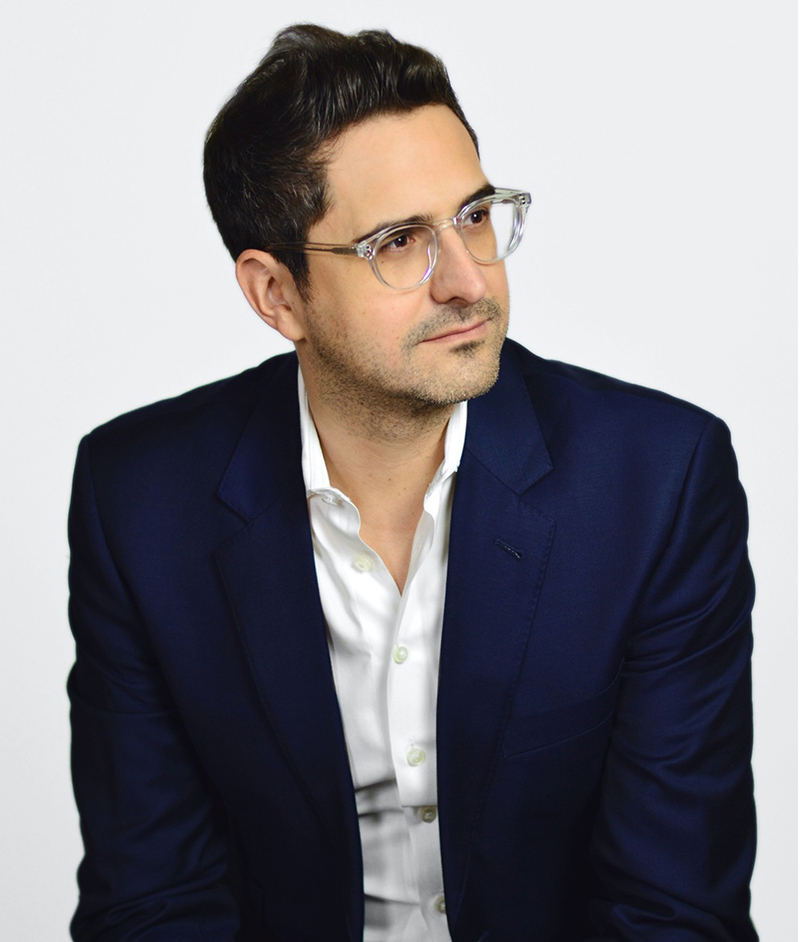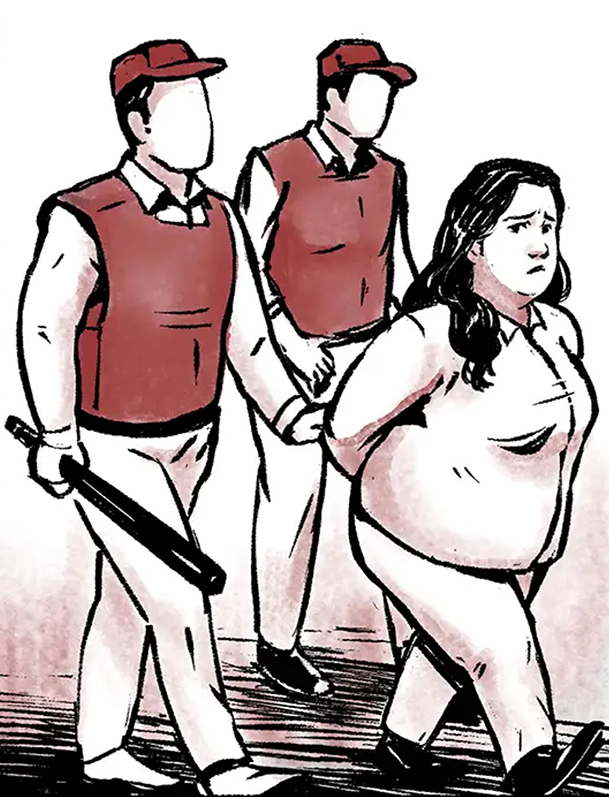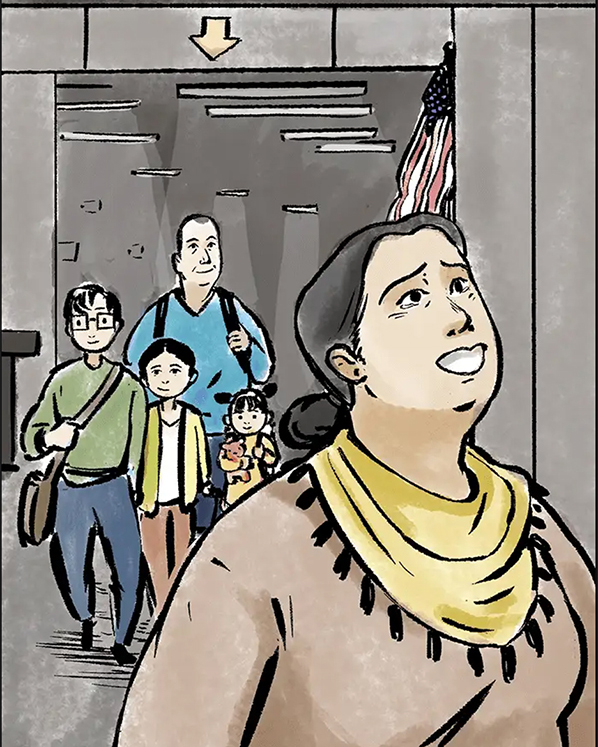Anthony Del Col’s inspiration to become a storyteller was sparked at Laurier.
The Brooklyn-based writer and producer attended a friend’s theatrical production as part of a third-year French class when Del Col (BBA ’00) was in his first year at Laurier.
“I saw how much fun my friend was having on stage,” Del Col says, admitting he understood little of the French dialogue. “It made me recall the fun moments I had in high school acting, shooting films and writing stories. And in the process, I came to the realization that I wanted to become a storyteller upon graduation.”
Del Col describes a “long, winding road” after graduating from Laurier with a Bachelor of Business Administration to recently winning a 2022 Pulitzer Prize for Illustrated Reporting for his team’s work on I escaped a Chinese internment camp, an illustrated first-hand account of Zumrat Dawut’s experience living in the Xinjiang autonomous region in China as a Uyghur Muslim.
Del Col’s Business degree jump-started his career immediately after graduation, helping him secure a government grant to produce a feature film. That project served as a stepping stone to other opportunities.

Laurier graduate Anthony Del Col was recently awarded a 2022 Pulitzer Prize for Illustrated Reporting for his team’s work on I escaped a Chinese internment camp, an illustrated first-hand account of Zumrat Dawut’s experience living in the Xinjiang autonomous region in China as a Uyghur Muslim.
“My Laurier degree allows me to look at everything I create from not only a creative perspective, but a business one, too,” he says. This combination of perspectives allows Del Col to consider a project’s audience, funding opportunities, and determine the scope and medium of the final product. At the heart of his work, though, is Del Col’s love for telling stories and helping others tell theirs.
﹋﹋﹋﹋﹋﹋﹋

A panel from I escaped a Chinese internment camp (copyright Insider).
While his path was first inspired during that class play at Laurier, Del Col says he continues to find inspiration everywhere. Sometimes, as was the case with I escaped a Chinese Internment Camp, inspiration comes from Del Col’s research and engagement with current events.
The work is based on interviews with Dawut and what she says was her experience in a Chinese internment camp. Human rights groups believe China has detained Uyghurs against their will in a large network of what the state calls “re-education camps.” China has been accused of committing crimes against humanity and possibly genocide against the Uyghur population and other mostly Muslim ethnic groups in the northwestern region of Xinjiang. China denies all allegations of human rights abuses and claims the camps are aimed at combating poverty and religious extremism in Xinjiang.
When Del Col pitched the idea for I escaped a Chinese Internment Camp, he got an immediate green light. With this work, his team would be able to show readers what the Xinjiang internment camps look and feel like.
“I had been aware of the genocide – yes, genocide – occurring in the Xinjiang region in China for a couple of years,” he says. “It was something that I couldn’t believe was happening and so few people knew about it.”
From there, he spoke to Uyghur organizations to find a survivor who would be willing to share their story. The Uyghur Human Rights Project led the team to Dawut, who Del Col describes as “one of the most courageous persons I’ve ever met.”
The finished story, illustrated by artist Fahmida Azim, is made even more powerful by its visual format, which lends an intimacy and immediacy to Dawut’s story.
“It’s one thing to hear or read about something happening,” Del Col says. “But if given images, it really makes it more real. It’s more immersive and we can really relate to the horrific odyssey that Zumrat Dawut went through.”
It’s a difficult story to read and was a difficult story to tell. Del Col says the interview with Dawut was among the most intense moments of his life.
“She broke down in tears a number of times and there were parts of her story that we weren’t able to fit into this version, elements that are just as horrific – if not more – than what made its way into the story.”
– Anthony Del Col
Despite the difficulty of some of Del Col’s darker stories, he says his two young children, aged three years and 15 months, help him find balance in his worldview.
“I look at them and I realize that they are our future – and I need to do everything I can to help make a difference in the world, whether it’s by entertaining audiences for a brief period of time or telling stories that raise awareness of what’s happening in the world, hoping that it will create change.”
﹋﹋﹋﹋﹋﹋﹋

A panel from I escaped a Chinese internment camp (copyright Insider).
Back in 2017, Del Col was making waves in the comic book world with Nancy Drew & The Hardy Boys: The Big Lie, a seedy, noir reboot featuring the classic characters. With other titles including Kill Shakespeare and the newly released The Death of Nancy Drew, Del Col is not shy about revamping – and killing off – beloved characters and well-known historical figures.
Del Col describes The Death of Nancy Drew – which is a follow up to The Big Lie series – as “a very noir take on the titular Nancy Drew and the Hardy Boys.”
“It was originally announced back in January 2020 and immediately went viral, being covered by the New York Times, CNN and other world media,” he says.
“There was a huge uproar about the fact that we were ‘killing’ Nancy Drew on the 90th anniversary of her creation, but as I assured everyone at the time: just read the first issue and let me know if you’re still upset.”
The book’s release was delayed by the COVID-19 pandemic, but it arrived in bookstores in June 2022.
Del Col has explored a variety of media in his work, including the audio thriller Unheard: the Story of Anna Winslow and a series of long-form illustrated journalism pieces for Insider, which includes I escaped a Chinese internment camp.
“It’s definitely a ‘medium-message’ thing,” Del Col says of his choice of media when starting a project. “In the audio space, the stories I’m creating are audio first. As a storyteller, I don’t have the option of showing someone’s face or establishing a location. It all has to come from sound.”
Del Col contrasts this with telling stories through the visual medium of comics.
“In comics, it’s all about the visual – the dialogue and captions are second. Is this a story that features a lot of talking heads? Probably not a great comic story. But something with unique visuals that will excite the reader? Or show them a place they’ve never been to? That’s the kind of stuff I’m looking for.”
Del Col believes the COVID-19 pandemic has changed how audiences engage with creative and journalistic content.
– Anthony Del Col
“Overall, I think more people have switched over to digital entertainment options,” he says. “In comics, a lot more people are reading their comics on their phones and tablets. The changes to journalism are the same. In fact, Insider’s win of our Pulitzer makes it only the fourth digital-only publication to receive that award – and a decade ago I believe it was zero.”
The Insider series began when artist Josh Adams was looking for a writer to collaborate with to create stories for the digital news publication.
“He thought of me because a lot of the stories I’ve told have had a political or intellectual thrust to them,” Del Col says. “We made a good team from the get-go and hit the ground running with our first story, about Donald Trump’s first impeachment in February 2020.”